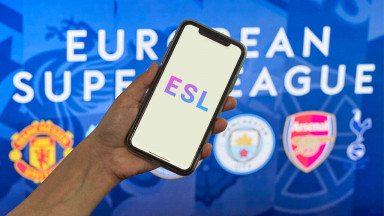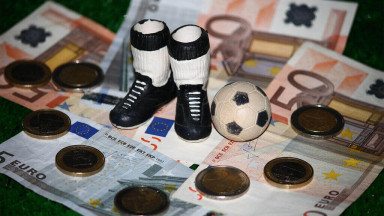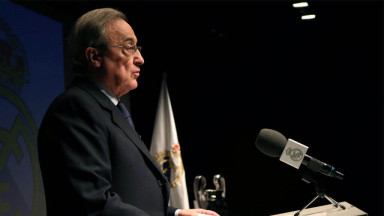European Super League and what led to its creation
A group of 12 elite clubs shook the football world with the announcement of the European Super League
By Admin | about 4 years ago
Person holding a phone in front of European Super League banner
On April 18 2021, a group of 12 clubs from England, Spain and Italy announced the formation of a breakaway league, leaving the UEFA-run Champions League for good. The announcement was met with strong criticism from fans, pundits and even governing bodies, demanding heavy sanctions against the clubs involved.
I know most of you reading this would already know the specifics of the League per se, so let me spare you the details and instead talk about the key events that led to the formation of the European Super League, a league that was supposed to be a “closed shop” for the most part while guaranteeing a permanent spot to the founding clubs, effectively eliminating the jeopardy of relegation.
THE BEGINNING
It all started with the globalisation of the game as football went from being a popular sport to a global spectacle. In that period, football added millions of supporters from around the world and saw some lucrative broadcasting deals and sponsorships come its way, witnessing significant growth in the market. The flood gates were open. Players could sign for clubs overseas as travel and work permit restrictions were eased. Fans living thousands of miles away could watch their teams play from the comfort of their homes. It was under the influence of this evolution that the Premier League and the Champions League emerged.
""
We're in a period of owners who are investors and an investor’s first target is to make more money
Soon, the economy of the industry changed. With billions pouring in, football attracted businessmen from around the world who saw the sport as an enticing prospect for investment. They started acquiring majority stakes in clubs, setting off a new trend in club ownership. Football clubs, once owned by fans and local businessmen, have fallen into the hands of billionaires who have no direct connection with the club or the city, rather looking to venture out into a fairly promising market in hope of multiplying their fortune. As the former Arsenal manager and FIFA's head of global development, Arsene Wenger, said in an interview, “We're in a period of owners who are investors and an investor’s first target is to make more money.”
THE ECONOMIC IMPACT OF GLOBALISATION ON FOOTBALL
At the onset of globalisation, not many regulations were in place. Billionaire owners began to invest ruthlessly in their clubs, competing in a multi-way tug of war for success. The fierce competition raised the stakes for these clubs, skyrocketing the demand for talented players. Soon, player transfer fees and wages saw a surge and so did money’s role in football. The ever increasing demand saw many players migrate from other parts of the world to Europe. Football players became more influential than ever, enjoying lucrative contracts and a huge following that often eclipsed that of football clubs.
Photograph depicting money involved in football
Globalization did not reward all clubs proportionately, however. The big-money clubs capable of employing high-profile players and paying them exorbitant wages had an upper hand over the rest. The capacity to house big-name players not only adds value to the club’s brand but also enables the team to play a more attractive style of football which would make them more appealing to a wider audience, therefore, helping them build on their supporter base. The rest of the clubs, on the other hand, could not afford that brand of football and got increasingly left behind. The concentration of money amongst a few big clubs led to the concentration of quality, leading to a globalization-fueled-revenue-polarization.
THE DISPARITY IN INCOME BETWEEN CLUBS
Now let’s take a peek at some of the revenue sources that football clubs rely on, starting with by far the most significant one- the broadcasting revenue. It comprises both domestic as well as international TV and streaming rights. The broadcasting revenue saw a rise, not only domestic but even international broadcasting rights which once constituted a small chunk, took off as football gained traction worldwide and formed a major portion of the gross revenue. The share clubs received from broadcasting depended on the league they played in. Certain leagues, like the English Premier League, gave a fair share of the amount to all the participating clubs while in other leagues, the difference in what top clubs earned as compared to others was remarkable.
Comparing the significance of broadcasting revenue in a club’s total income, it is understood that smaller clubs are way more dependent on it than the bigger ones. This is understandable since smaller clubs lack lucrative sponsorship deals, high matchday income, commercial earnings or a place in European/International competitions that the bigger clubs regularly manage to acquire. Participation in European/International tournaments such as the UEFA Champions League or the FIFA Club World Cup not only grants a core income of its own but also boosts the other revenue streams as clubs get exposed to a wider audience.
Let’s look at a greater depth as to why a place in European competition can make a world of difference for football clubs. The UEFA Champions League is a top tier European competition and arguably the most prestigious and most watched football tournament in the world, where the best teams from across Europe are pitted against one another. The qualification is based on the previous year’s domestic league standings and the number of clubs allowed to qualify varies with each league. The money in the Champions League is too good to miss for any club as qualifying for the group stages alone gets you about 15 million euros with each win worth an additional 2.7 million euros. The winner of the tournament can expect at least 76 million euros while generally, it is even higher. Though the qualifying criterion in itself seems fair, the concentration of wealth among a few clubs has a strong influence in determining who qualifies for the competition.
The growing disparity among clubs as witnessed in the domestic leagues has led to a situation that sees the same crop of clubs repeatedly qualify for these competitions. What makes the situation worse is that in addition to highly rewarding sponsorships and broadcasting deals, they have secured another stream of income for themselves in the Champions League. The additional income allows them to invest more in the club, furthering their chances of securing a place in the tournament. Regulations were eventually put in place, of which the most prominent one was the FFP (Financial Fair Play). It was brought to ensure that teams spend no more than what they earn, thereby preventing them from getting into financial troubles.
HOW FAIR IS THE FINANCIAL FAIR PLAY?
The FFP, at first glance, might seem like the ideal solution to curb overspending by the big-money clubs and mitigate the influence of their financial supremacy. But it didn’t go quite as planned.
The initial signs were positive. Since its introduction, clubs started performing better financially and were able to show profits for the first time in years. However, what remained unchanged was big clubs adding a lot more wealth than others, further widening the gap in terms of revenue generated. Again understandably so, since the smaller clubs were given no chance to challenge the monopoly of the bigger clubs. As per the rule, the amount of money a club could spend is determined by its financial performance. So, clubs that managed to rake in wealth before the introduction of FFP, had an added advantage as they leveraged their wealth to procured better sponsorships, broadcasting deals and other commercial benefits that the others couldn’t, thanks to the rule of law.
It doesn’t end here. History suggests that the law appears fragile when big-money clubs are in question. FFP doesn’t penalize clubs that are in massive debt. This is somehow deemed sustainable whilst punishing clubs for overspending even when their owners have reassured their commitment to their clubs come what may. Due to heavy competition from others, clubs like Manchester United, Barcelona and Real Madrid ran up huge debts, crossing half a billion pounds. On the flipside, clubs owned by super-rich billionaires exploit the law by citing inflated sponsorship deals that often involve companies directly or indirectly owned by the very same people. This is a clever way of injecting money into the club, disguised in spurious sponsorship deals, to show an increased income on paper thereby giving them the right to spend more. Essentially, the established rich clubs thrived under FFP, seeing an increase in their fortunes by several folds while other clubs continued to grow but at a relatively slow rate.
THE “SUPER CLUBS” WERE BORN
The unchecked growth of the big-money clubs driven by the shortcomings in the system saw the emergence of a new breed of clubs. They are no longer mere football clubs but large international brands that command most of the global football audience. These clubs operate on a completely different level whether on or off the pitch. At that level, the competition is so fierce that most of the clubs are having to punch well above their weight to cope with it. Clubs struggled to sustain losses and were drowning in massive debts. The global pandemic pushed these clubs to the brink as the world went into lockdown. With stadiums empty and stores closed, revenue had taken a serious hit putting businesses in the doldrums.
In a difficult time such as this, the clubs turned to a resolution that would bail them out of the adversity without making many compromises. Most of them agreed to the idea and the European Super League was formed. With each founding member to receive a share of the initial infrastructure grants that amount to at least 3.5 billion euros, more commercial benefits were to follow as a bonus for participating in arguably the biggest spectacle sports was about to witness. Not to mention, this also included a guaranteed spot in the competition every year irrespective of the performance. For them, the luxury that European Super League offered was a better alternative to downsizing and living within their means.
A BRIEF ROUNDUP OF THE HAPPENINGS
To recap, football had witnessed a complicated cycle wherein the more money the big clubs make, the more they can invest and become more attractive to audiences. This further empowers them to strike better commercial deals and make more money, growing even better and more attractive to watch. This virtuous cycle of unregulated success kept widening the gap between the big clubs and the rest of the competition until the point where they started dominating the sport. Ultimately, the clubs decided to form a breakaway league that would mostly be a “closed shop” devoid of the jeopardy of relegation.
Real Madrid president Florentino Perez
When Florentino Perez, the brains behind ESL said it was created “to save football”, he must be referring to the “super clubs” rather than the sport. At the end of the day, they are the ones who command the majority viewership. So, if they suffer football suffers too. They fear people would turn away from the sport, putting the future of the game under threat. He also went on to say, “young people are no longer interested” in the game, which indicates the fact that domestic competitions have become largely uncompetitive and boring, making it less appealing to the younger generation. They’d rather have an improved tournament where only the best teams compete. Is this the common sentiment among the younger fans? At least it’s what the guys who created the Super League believe.
Will a tournament like ESL destroy the sport or improve it? Was the decision taken out of concern or greed? Such questions may arise in one’s mind. Though debating them would be beyond the scope of this article, the announcement shouldn’t have come as a shock. The pandemic could have been the last straw but the Super League was a storm that has been brewing for quite some time. We had all witnessed the direction football was headed in. The competitive and financial imbalance in the leagues and cup competitions was there for us to see. We saw season after season the same bunch of clubs bag the domestic cup competitions. We saw the domestic leagues split into a group of title contenders while the rest primarily focused on avoiding relegation. Football, the people’s game, needs reform, there are no two ways about it, but whether it would be in the hands of supporters or businessmen, remains to be seen.












